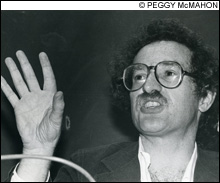Dworkin scorned the notion of a "humanism" that has failed to make a distinction between the pornography of the past, which was entirely dependent on words and graphic rendering, and current pornography, which uses real live women. "Where is the visceral recognition, the humanist recognition that it is impossible and inconceivable to tolerate it -- let alone to sanction or to apologize for the tying and hanging and chaining and bruising and beating of women? I am saying what no one should have to say, which is simply that one does not do to human beings what is done to women in pornography." She ended with a challenge: "Now I ask you: what are we going to do?"
She sat down, mopping her brow. The audience was predictably enthusiastic, constituted as it was largely of women ready not only to agree with Dworkin as a thinker and theorist but also to embrace her as a sister.
Into this admittedly charged and hostile atmosphere walked, Alan Dershowitz, who, from the first moment, alienated a crowd that was suspicious but also prepared to listen. He decided not to stand at the podium to make his remarks. In fact, it appeared that he had not prepared a formal reply at all. Instead, he ad-libbed, taking a few pot shots at Dworkin's book, Pornography: Men Possessing Women, by quoting some strongly worded sections out of context and by calling the book "sexist" because of her use of the word "boys" to describe men.
He asked the people in the audience whether, after hearing Dworkin's speech, they believed pornography should be banned. And he claimed that he, as a defender of the First Amendment, was paying Dworkin the highest compliment possible by calling her book "truly dangerous," adding that "Andrea Dworkin is a truly dangerous person." Then he congratulated himself for defending even so dangerous a person's right to free speech.
Dershowitz did cite the argument that has effectively persuaded many feminists over the past decade: that pornography is an issue better left alone because, as he put it, "The people who will define pornography (to censor it) will use that definition of pornography against Andrea Dworkin and you and me." He claimed her book would be banned in 180 countries around the world today. "You can't have it both ways," he warned. "You want Dworkin, you've got to take pornography."
|

Alan Dershowitz
|
But then he committed his most grievous error. Dershowitz, the man who says he is “proud to have represented some pornographers, also Nazis, Communists, and others I despise,” held up examples of anti-Semitic propaganda and said, “You should understand all the vicious stuff out there and where pornography ranks … for every group, Jews, Chicanos, blacks, there is pornography.” The implication that the brutalization of women is somehow less offensive than the brutalization of Jews – or blacks or others – epitomized Dershowitz’s failure to confront seriously the issues Dworkin raised. His hammering away on the theme of Western superiority (it’s so much better for women here compared to countries where pornography is censored) was an affront to women who were keenly sensitive to the outrages committed against them daily, not only in pornography, but in the street, the family, and the workplace.
The women in the audience became increasingly angry. The heckling, at times, overwhelmed Dershowitz, whose response to the interruptions was to smile like a martyr overwhelmingly committed to freedom of expression.
To Dworkin’s exposition of the degradation of women in pornography and its reflection of cultural misogyny, Dershowitz essentially waved the flag. He used phrases like “the marketplace of free ideas,” and “the cherished right of free speech.” He sounded the theme that “things are getting better for women all the time.” Dworkin retorted that the legal system was “part of the system of cruelty” against women. “If you think this ethical system will defend the rights of women, that’s just hallucinatory.”
Dershowitz pleaded for unity. He called himself a feminist. He said that in the next forum, “we should all be on the same side.” Dworkin said, “you are not on our side.” It was a classic confrontation between the radical and liberal. Dworkin’s activist critique of the cultural underpinnings of the legal system in some ways pre-empts a First-Amendment defense. Still, there is a need for practical strategies that take the current legal system into account as necessary and vital – a need that many members of the audience were more than willing to acknowledge. But Dershowitz – the flamboyant golden boy of the First Amendment, he who identified himself as a feminist, as a critic of the system, as part of what he claims is only “one percent” of dissent – could not take Dworkin’s challenge to consciousness as anything but an attack on his turf.
***
During an interview the day after the debate, Dworkin talked about her goal in writing Pornography. “I wanted to and I hoped I did create a time bomb and plant it in the innards of the system with parts of it going off at different times, creating some breach in the male supremacist system, creating the chance to give women a creative approach to freedom.”